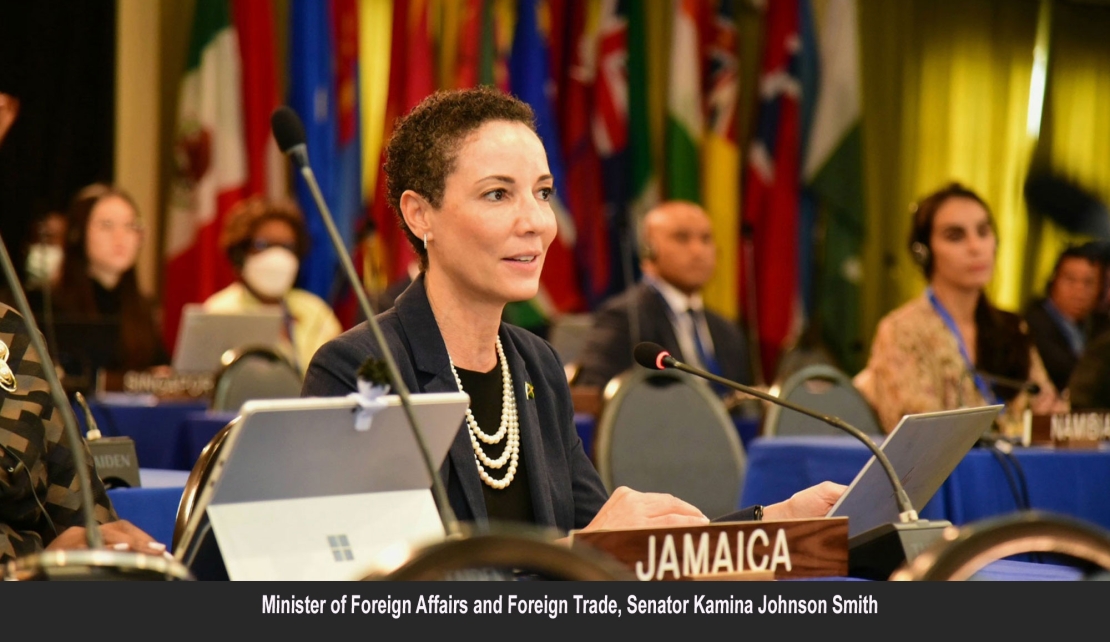JAMAICA | While not supporting a moratorium, Jamaica Gov't wants regulations in place for deep sea mining to proceed

KINGSTON, Jamaica, August 4, 2022 - Despite calls from Civil Society that Jamaica supports a universal moratorium on deep sea mining, the government intimates that it will support deep-sea mining in the International Seabed Area if there is a suitable regulatory framework in place.
Minister of Foreign Affairs and Foreign Trade, Senator Kamina Johnson Smith says “While Jamaica continues to attach significant importance to the full and effective implementation of [the] United Nations Convention on the Law of the Sea (“the Montego Bay Convention”), I wish to state unequivocally, that the Government of Jamaica is not prepared to support deep-seabed mining before an appropriate, robust regulatory framework is put in place, in keeping with the guiding thrust of our deliberations,” she said.
Senator Johnson Smith was addressing the International Seabed Authority (ISA) Special Commemorative Session for the 40th anniversary of the adoption of the Montego Bay Convention, held at The Knutsford Court Hotel in St. Andrew, on Monday (August 1).
She stressed that the country remains committed to developing a sound, stringent, balanced, and comprehensive regulatory framework in relation to the future development of deep-sea mining in the International Seabed Area.
“We are guided by the tenets of the precautionary approach, best available science, and transparency and equity, in accessing the Area and its resources, to safeguard the ‘common heritage of humankind’,” she said.

Senator Frazer Binns said “given the destruction of the terrestrial environment which has led to unprecedented negative effects on the environment, climate change and peoples’ livelihood, world leaders cannot at this time, in good conscience accede to deep sea mining.
“If we are serious about the use for the benefit of mankind, then we must at a minimum know all the benefits and challenges of deep sea mining. Accordingly, a moratorium is not only the right thing to do but the responsible thing to do for all mankind,” she said.
“While we recognize the financial benefits that deep sea mining could bring, the Opposition is concerned about the irreversible and catastrophic effects that digging up the sea floor can cause.
“Our concerns include: The real effects of deep sea mining on the environment are largely unknown, with the little available information suggesting that the effects on bio diversity will not just be inevitable but irreversible. These include the extinction of various species and the disruption of the sea.
She said “disruption of ocean life will have negative effects on land, coastal communities and fisher folks who rely on the ocean for their survival. We must also consider the effects on marine life including our corals and species still yet unknown.
“Deep sea mining ought not to take place without the full engagement of all stakeholders, particularly those who are most likely to be impacted.
"Protecting our deep sea will protect our future. Jamaica’s commitment to its people must be evident in its vote for a moratorium on deep sea mining," the Opposition spokesperson declared.
Minister Johnson Smith pointed out that the adoption of the Montego Bay Convention is significant, as it serves as a best practice for the governance of global commons, noting that it is one of the first, and few instances, in which the interests of humanity have been elevated above State sovereignty and national interests and codified in international law.
“Jamaica is, therefore, extremely proud of its contribution to the elaboration and eventual adoption of the Montego Bay Convention. We are also proud of our historical leadership, along with others, in strengthening the rule of the law of the sea,” she said.
Senator Johnson Smith further noted that an intrinsic contribution to the relevance of the Convention is the Tribunal for the Law of the Sea, which, through its legal framework, has clarified member States’ collective responsibilities as to the stewardship of the International Seabed Area.
“This legal framework has also facilitated the successful negotiation of countless maritime disputes. The Convention also continues to guide our collective efforts to regulate the conservation and sustainable use of marine biological diversity in areas beyond national jurisdiction,” she said.
Additionally, she noted that the Convention is one of the few international legal instruments that have codified and institutionalised safeguarding the special interests and needs of developing countries, including Small Island Developing States (SIDS), in the regulation of global commons.
In the meantime, Mrs. Johnson Smith praised the important work of the Authority and the Secretariat over the years, in boosting public awareness, filling the gaps in existing scientific knowledge and supporting developing States through capacity development and technology transfer.
“This will further enable our full and effective participation in marine scientific research and our informed deep-sea decision-making,” she said.
Headquartered at the Jamaica Conference Centre, ISA is an autonomous international organisation established under the 1982 UN Convention on the Law of the Sea and the 1994 Agreement relating to the Implementation of Part XI of the Convention.
The Authority is the body through which State parties to the Convention organise and control all mineral-resources-related activities in the Area for the benefit of mankind. In so doing, ISA has the mandate to ensure the effective protection of the marine environment from harmful effects that may arise from deep-seabed-related activities.
